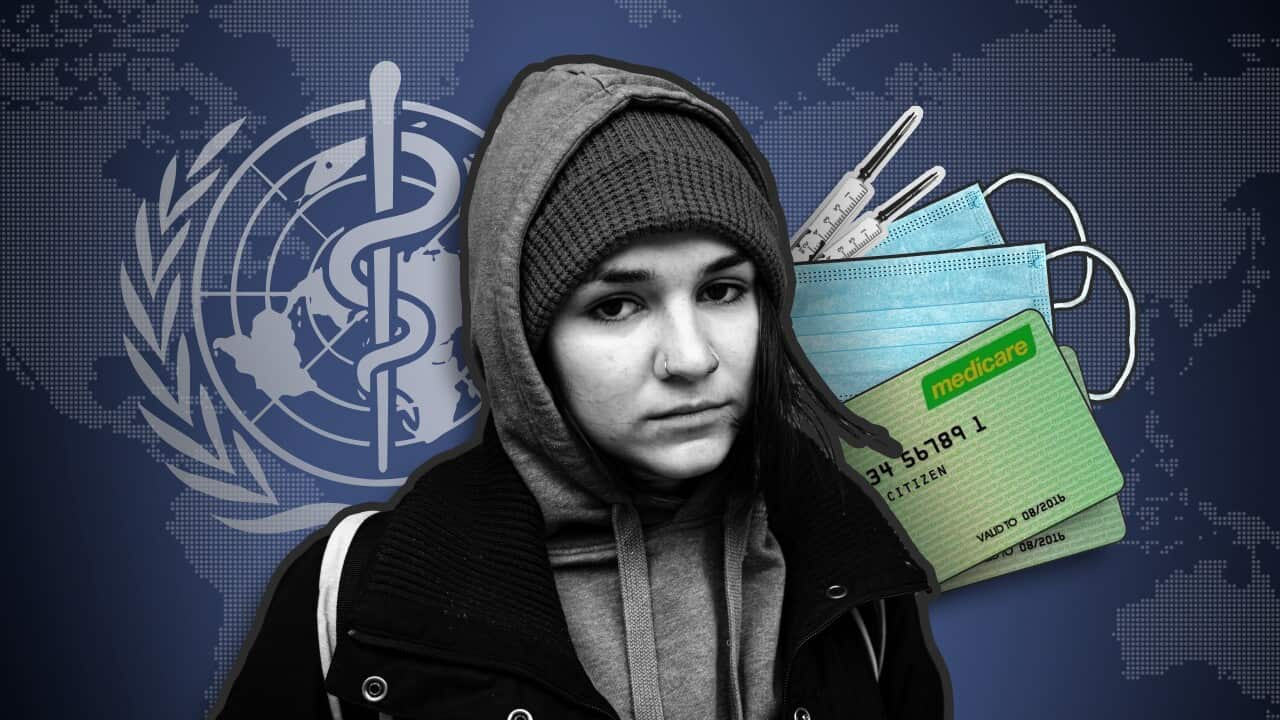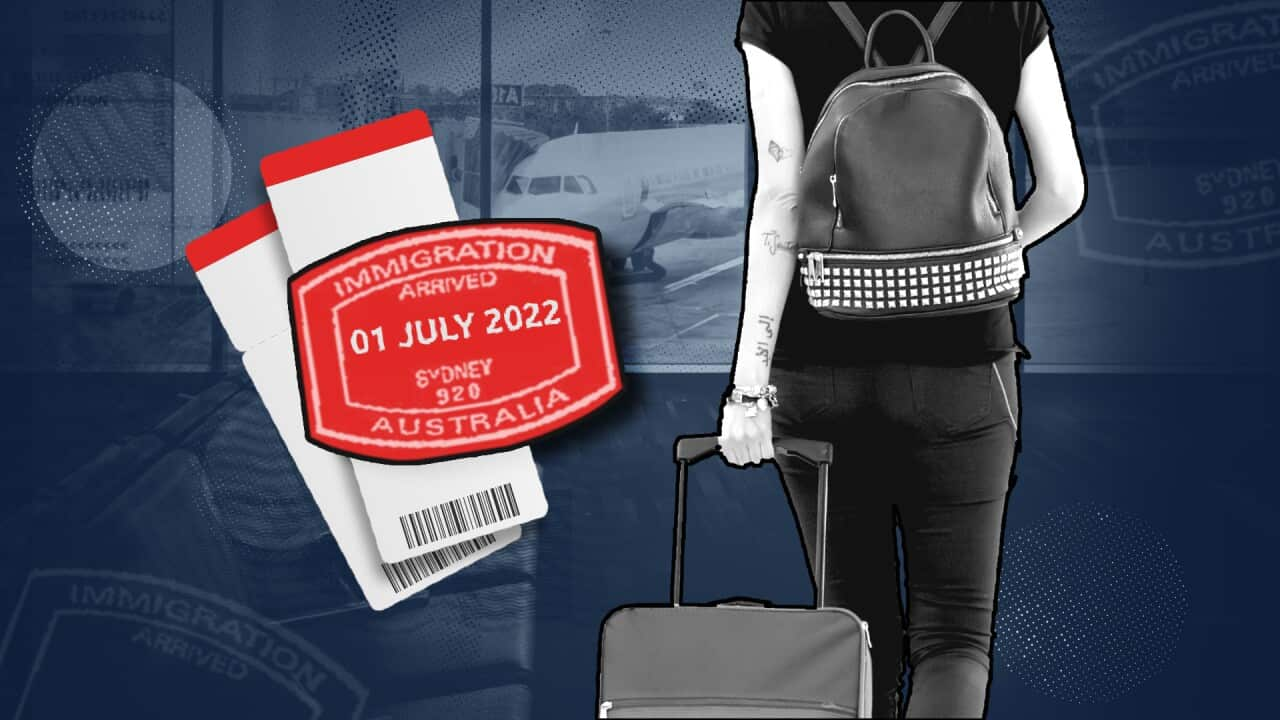Key Points
- Migrants and refugees around the world experience poorer health outcomes than those in their host communities.
- In Australia, migrants face significant challenges, such as language barriers, when it comes to accessing healthcare.
Millions of migrants and refugees around the world experience poorer health outcomes than those in their host communities, a new report by the World Health Organization (WHO) says.
In Australia, in addition to Australian and New Zealand citizens, permanent residents and those applying for permanent residency, a number of other visa holders and many migrants and refugees qualify for Medicare benefits.
While international students don't qualify for Medicare, they're covered by the Overseas Student Health Cover (offered by select health funds), for which the lowest cost of minimum cover is $478 for 12 months of singles.
But according to multicultural advocates, such as Rita Prasad-Ildes of Queensland-based World Wellness Group, migrants and refugees – even those who have access to Medicare – face “significant issues”.

Rita Prasad-Ildes of Queensland-based World Wellness Group said migrant Australians face “significant issues”. Credit: Supplied
Financial issues are only part of the problem, with GP visits potentially costing hundreds of dollars for people without Medicare.
According to Deb Stringer — CEO of the Australian Refugee Association — the language barrier is the most significant issue.
“The entire [healthcare] system is set up for people who have learned English their whole life,” Ms Stringer told SBS News.
“I don’t think there’s enough thought about servicing all the people in Australia who are now Australian residents, whose first language isn’t English and who haven’t grown up in the Western health system.
“The health sector could do a lot more to make more inclusive programs.”
COVID-19 death toll three times higher among overseas-born Australians
Ms Prasad-Ildes said the COVID-19 death rate in Australia shows how disadvantaged migrant and refugee populations are when it comes to healthcare.
She was referring to Australian Bureau of Statistics data released in February, which showed overseas-born residents of Australia have died from COVID-19 at three times the rate of people born in the country.
“For some communities, like the Middle Eastern communities, [the COVID-19 death rate] was like 10 times higher,” she said.
Ms Stringer said COVID-19 messaging is a “pretty good example of how the health messaging didn’t serve these communities well”.
“First of all, some of the early translations were incorrect,” she said.
“[Then], there was an expectation that people could navigate complex online systems to get the right information, which wasn’t feasible for some communities, particularly those who lack access to technology, let alone have digital literacy.”
Ms Stringer said a huge amount of information was being dumped into the communities but there was “very little understanding of how particular communities access information”.
It’s worse for refugees
Jana Favero is the director of Advocacy and Campaigns at the Asylum Seeker Resource Centre in Melbourne.
She told SBS News the healthcare disadvantages refugees and asylum seekers face in Australia are worse than those encountered by skilled migrants.
“People seeking asylum and refugee [status] are really on the whim of what visa they’re on and the conditions on the visa,” Ms Favero said.
“About 20 per cent of people seeking asylum actually don’t have access to Medicare."

Jana Favero is the director of Advocacy and Campaigns at the Asylum Seeker Resource Centre in Melbourne. Credit: Supplied
“It’s an absolutely complex and nightmare [of a] system … It depends on what visa you’re on and the condition on that visa,” she said.
“We have seen two people in exactly the same situation and one may or may not have work rights and the other may or may not have [access to Medicare].”
In a statement to SBS News, the Department of Home Affairs said all permanent refugee and humanitarian and protection visa holders have access to Medicare and other health services such as the Program of Assistance for Survivors of Torture and Trauma.
"Protection visa applicants who are granted an associated bridging visa, which allows them to remain lawful in the community while their visa application is being processed, may have access to a range of services offered by the government such as Medicare and the public health system, education for school aged children, assistance with finding employment, if they have work rights, translating and interpreting services, and if eligible, the Australian Government’s Status Resolution Support Services Program."
What does the report say?
Migrants and refugees aren’t “inherently less healthy”, the World report on the health of refugees and migrants from the WHO said.
But factors such as education, income, housing and access to services result in poorer health outcomes for these communities.
The situation is further exacerbated by linguistic, cultural and legal barriers, according to the report.
“Today there are some one billion migrants globally, about one in eight people,” WHO chief Tedros Adhanom Ghebreyesus said in a statement on Wednesday.
People seeking asylum and refugee [status] are really on the whim of what visa they’re on and the conditions on the visa.Jana Favero
“This report is the first to offer a global review of refugee and migrant health; it calls for urgent and collective action to ensure they can access health care services that are sensitive to their needs,” he said.
The report is based on a recent meta-analysis of more than 17 million participants from 16 countries and said “a significant number of the 169 million migrant workers globally are engaged in dirty, dangerous and demanding jobs, and are at greater risk of occupational accidents, injuries and work-related health problems than their non-migrant counterparts”.
Mohammad Al-Khafaji, CEO of the Federation of Ethnic Communities' Councils of Australia (FECCA) agrees with the findings of the report.
“The report confirms our experience in Australia that government services are often not responsive to the many complex needs of migrant and refugee communities, and this requires urgent attention,” Mr Al-Khafaji said in a statement.
Is change on its way?
Ms Prasad-Ildes said the government is taking some measures to address the issue.
Funded by the federal government, Ms Prasad-Ildes’ Brisbane-based World Wellness Group has launched a multicultural health-focussed helpline called Multicultural Health Connect (1800 186 815).
“It’s a national pilot that’s currently live in Victoria [and] will be progressively rolled out across Australia,” Ms Prasad-Ildes said.
“It’s a health information line specifically for the multicultural communities in Australia for health information and advice in any language.”
In a statement to SBS News, a Department of Health spokespersaon said culturally, linguistically and ethnically diverse communities have been identified as a priority population in multiple national strategies and action plans, acknowledging the health disparities experienced by these groups.
“The need for culturally appropriate, readily understandable, accurate and timely access to services was highlighted during consultations to support the development of the Primary Health Care 10 Year Plan," the spokesperson said.
“The Department is currently working with Healthdirect to pilot a CALD [culturally and linguistically diverse] helpline catering for callers from culturally and linguistically diverse communities. It is envisaged that the helpline will improve health system navigation and access to health advice for issues prevalent in CALD communities.”
Mr Al-Khafaji of FECCA is the co-chair of the Australian Multicultural Health Collaborative, launched recently to provide leadership, address health inequities, and advocate for better health outcomes for refugee and migrant communities.
“We look forward to working with the Australian government towards achieving greater health equity and better health outcomes for all Australians,” Mr Al-Khafaji said.












